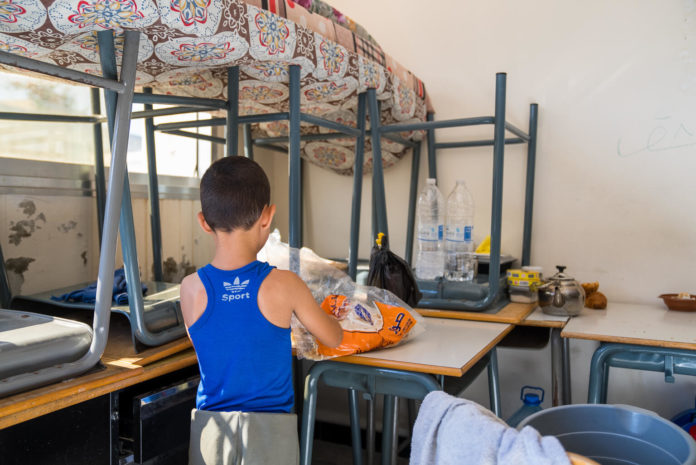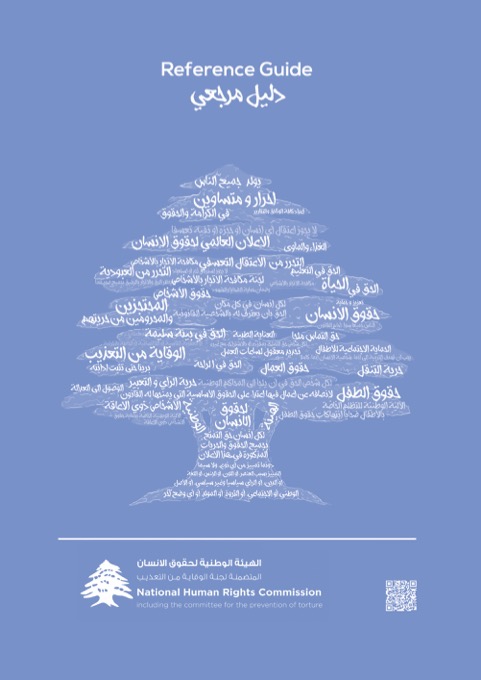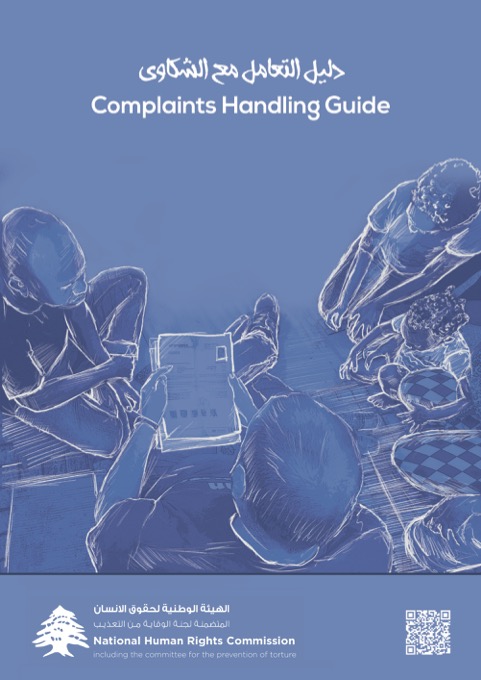هذا التقرير متاح أيضًا بـ: العربية (Arabic)
The National Human Rights Commission, which includes the Committee for the Prevention of Torture, announced that, based on its commitment to effectively include children’s rights in its work and the work of its commissions, it has prepared a written contribution to the UN Committee on the Rights of the Child, which is currently drafting general comment No. 27 on children’s rights to access to justice and effective remedies.
The Committee now seeks contributions from all interested stakeholders to clarify terms, approaches, and actions that states should take to implement the right of all children to access justice and effective remedies.
The Committee on the Rights of the Child has decided to dedicate its 27th General.
Comment to Children’s Rights to Access to Justice and Effective Remedies. Access to justice has an essential role in combating inequalities, challenging discriminatory practices, and restoring entitlements that have been denied. It also advances the accountability of State and private actors in the fulfillment of their obligations. A vast majority of children whose rights are violated do not have access to justice and do not receive remedies following violations of their rights or denial of entitlements. Children’s dependent status, their lack of knowledge about their rights and the capacity to claim them, as well as the lack of accessible and effective complaint mechanisms at the local level are immediate barriers. If children do turn to the courts, the fact that legal processes are rarely child-friendly, in addition to the obstacles to attaining legal standing in many States, as well as economic, social, and cultural factors, create further impediments for children in pursuing remedies for breaches of their rights.
Access to justice and effective remedies are essential for protecting, promoting, and fulfilling all human rights. The Committee has affirmed that the right to a remedy is implicit in the Convention on the Rights of the Child. In contrast, this right is explicitly referred to in the other six major international human rights treaties. Access to justice is also an integral part of the Sustainable Development Goals (16.3).
Despite the recognition of this right, there remains a misconception that access to justice only relates to children alleged as, accused of, or recognized as having infringed the penal law, which is covered by the Committee’s General Comment No. 24 (2019) on children’s rights in the child justice system, which remains the central guidance to States in this regard. The issue of access to justice and effective remedies is much wider as explained below.
Children should be enabled to access relevant information and effective remedies to claim their rights, including through child rights education, counseling or advice, and support from community-based advisors and national human rights institutions, as well as a legal, paralegal, and other services.
The Committee on the Rights of the Child has emphasized in its General Comment No. 5 (2003) on general measures of implementation of the Convention on the Rights of the Child that all children’s rights must be regarded as justiciable, and it is essential that domestic law sets out entitlements in sufficient detail to enable remedies for non-compliance to be effective. General Comment No. 5 also specifies that ‘where rights are found to have been breached, there should be appropriate reparation, including compensation, and, where relevant, measures to promote physical and psychological recovery, rehabilitation and reintegration, as required by Article 39’.
Access to justice includes the ability to seek, individually or collectively, and obtain a
just, equitable, and timely remedy for rights violations. It comprises the right to be recognised before the law and to a fair hearing, right to appeal, equal and timely access to courts, adequate judicial protection and other complaint mechanisms to bring an effective outcome. These rights are also key to the rule of law and mean that everybody – including the most vulnerable child in the most remote area – must have access to justice and remedies. Experiencing the rule of law as children will also help them to value and contribute to a rule of law culture into their adult lives.
The National Human Rights Commission, including the Committee for the Prevention of Torture – Lebanon, considers that particular attention should be paid to the interests and circumstances of children’s rights to access to justice and effective remedies. NHRC-CPT’s commitment to integrating a child-sensitive approach is anchored in the language of this submission.
Children must have access to the right to be heard and protected from discrimination. Children face challenges in accessing this right, including the complexity of legal systems, the lack of awareness and information, fear of reprisals and stigmatization, social attitudes concerning children, and dependence on support from adults. Certain groups of children also faced additional obstacles in their access to justice, such as children in institutional care, migrant children, children living in extreme poverty, and children affected by conflict.
“Child-friendly” justice was age-sensitive, accessible, speedy, diligent, suited to the child’s rights, and supported a child to participate in and understand proceedings. This included not only penal but also civil and social assistance proceedings, covering such diverse cases as asylum seekers, migrant children, rape, abuse and divorce.
When applied to children, the key elements of ‘access to justice’ and ‘effective remedies’ should include practical approaches to ensure that accountability for children and youth is a core part of the general comment.
For children, the justice system was complex and a labyrinth—an unknown universe they could not understand. Access to justice required a well-equipped system with capacity and resources, but it also had to be one that children understood, felt close to, trusted, and did not threaten them. States needed to have mechanisms for specialized legal aid for children and professional codes of conduct to know how to engage with children.
NHRC-CPT’s contribution stressed the importance of Child-Friendly Legal Systems that must be adapted to children’s specific needs and understanding, ensuring they are not intimidating or overly complex. This includes simplified language, child-sensitive procedures, and less formal environments. Children should be empowered to participate in legal proceedings that affect them. This includes the right to be heard, directly or through a representative, and providing appropriate support to understand and engage with the process. Safeguards must be in place to protect children’s identities and personal information during legal proceedings to prevent re-victimization and stigma. Children and their guardians must be informed about their rights and the legal avenues available to seek justice, including legal aid services. Children should have access to competent legal representation, which may require the state to provide free or subsidized legal aid in cases where they cannot afford it.
Remedies should be provided without undue delay, considering the impact of time on a child’s development and well-being. They should be tailored to the specific harm experienced by the child and adequately address the violation fully. This may include restitution, compensation, rehabilitation, satisfaction, and guarantees of non-repetition. Remedies should consider the child’s overall well-being, including physical, psychological, and social aspects, ensuring that the response addresses the full impact of the violation. Those responsible for violating children’s rights should be held accountable, with measures in place to ensure that justice is served and that similar violations do not recur. Access to services such as counseling, medical care, education, and social reintegration should be part of the remedy to help children recover from the harm they have suffered. There should be mechanisms to monitor the implementation of remedies and ensure they are effectively enforced, with the possibility of further legal action if remedies are not properly executed.
At a national level, the NHRC-CPT set out two main aspects that need to be considered: the empowerment of children to claim their rights, including awareness of rights, the provision of appropriate information, and recognition of children’s evolving capacity, and the ability of national legal systems to accept and address challenges faced by or on behalf of children. This requires child-sensitive procedures that are independent, safe, effective, and easily accessible.
In 2023, NHRC-CPT conducted 228 visits to 190 detention centers managed by the Directorate General of Internal Security Forces – Ministry of Interior and the Lebanese Army – Ministry of Defence. NHRC-CPT concludes that detaining juveniles, both male and female, with adults, in places of detention affiliated with the Internal Security Forces and interrogating them without the presence of a juvenile representative, in many cases, contradicts the Lebanese Law for the Protection of Juveniles in Conflict, and Article (107) of the Code of Procedure, as well as international laws, which protects the rights of juveniles and children deprived of their freedom.
Visits to detention centers revealed that some children lacked visible signs of puberty or appeared underage yet were held in adult police stations. This practice directly contradicts Lebanon’s legal framework. In one instance, a detainee was arrested and tried based on a self-declared identity, only to reveal a different one after acquittal. This raises serious concerns about age verification procedures. When questioned about how they verify identity and age, detention center officials stated they rely on detainee or family-provided documents if official identification is unavailable.
The visits made by the experts to detention centers revealed that in some centers, juveniles are detained in adult police stations. Some female minors arrested in the Dahr al-Bashek prison said that they had been detained in police stations with adult women until an arrest warrant was issued against them. After investigation, it was revealed that there are no police stations dedicated to female minors in the temporary detention centers (police stations). Female minors are detained in cells devoted to women in violation of the national laws.
The visits revealed that many juveniles are detained for a period exceeding the legal pre-trial detention period stipulated in the Code of Criminal Procedure. In addition, a number of them had been held in garde à vue for over forty-eight hours, in contravention of Articles 107 and 108 of the Lebanese Code of Criminal Procedure, Article 37 of the Convention on the Rights of the Child, and Rules 13, 17, and 20 of the United Nations Standard Minimum Rules for the Administration of Juvenile Justice.
Experts’ visits to juvenile detention centers and interviews with minors revealed another concerning issue. In some cases, minors couldn’t differentiate between the juvenile representative and ISF members in civilian clothes. Responses could have been more apparent when asked about the presence of a juvenile representative during interrogations. Some said they “didn’t know,” while others confirmed having only one person present or the representative attending remotely via video call.
Detention center officials acknowledged instances where the juvenile representative couldn’t attend interrogations due to late hours or transportation issues. In these cases, they relied on video calls, raising concerns about the effectiveness of remote participation. Additionally, officials claimed a judge’s order could suffice for family presence to replace the representative, a practice lacking legal basis. Furthermore, during remote interrogations by judges, the representative was present in the judge’s office, not at the detention center where the juvenile was being questioned.
The law mandates the presence of a juvenile representative during interrogations to safeguard the child’s well-being. This representative provides psychological support, monitors procedures, and protects the child from pressure or violence. They also educate minors about their rights. A representative must be present during questioning to maintain these crucial protections. Leaving the child alone with investigators hinders the representative’s ability to ensure no abuses occur, constituting a violation of Article 34 of Lebanon’s Law on the Protection of Juveniles.
Interviews with the investigating officers and officials in juvenile detention centers revealed that a number of them restrict the procedures observed during the interrogation of minors to contacting the juvenile representative. As for inquiring whether the suspect wishes to appoint a lawyer per Article 47 of the Code of Criminal Procedure, they deem this step not to constitute a condition for interrogating juveniles. This, however, needs to be revised and a more comprehensive understanding of the law. Article 42 of the Law on the Protection of Juveniles in Conflict with the Law or at Risk stipulates that “The presence of a lawyer alongside the juvenile is compulsory in criminal and other trials. If the juvenile’s family or those concerned with their affairs do not attempt to secure a lawyer where required, the court may assign a lawyer or request one from the lawyer’s syndicate.”
Lebanon’s juvenile detention centers mirror the harsh conditions found in adult facilities. Family visits, a fundamental human right, are often restricted. The Commission’s experts observed that in many centers, meetings occur behind police station doors, lacking dedicated spaces for minors to meet their loved ones. Additionally, phone contact with the outside world is inconsistent. While some centers offer this option, others, like Dahr al-Bashek prison for girls, severely limit it. There, girls reported being unable to contact their families for three weeks due to a lack of functioning phone equipment (no Telecart).
This is considered a violation of minors’ rights to communicate with the outside world, as Paragraph (c) of Article 37 of the Convention on the Rights of the Child provides for the right of a child deprived of their liberty to maintain contact with their family through correspondence and visits, save in exceptional circumstances.
It should be noted here that there are many Syrian detainees, including juveniles, who enter the country clandestinely. Suppose they get arrested on suspicion of a crime other than entering clandestinely or disrupting their stay. In that case, their acquittal from the latter crime does not shield them from being detained by the General Security for entering Lebanon illegally. Subsequently, they spend several months in police stations, eventually becoming a burden and causing disturbances. At the same time, their rights as juveniles are violated due to the lack of a mechanism allowing for their repatriation by General Security.
NHRC-CPT stresses the necessity of introducing fundamental amendments to Law No. 422/2002 (Protection of Juveniles in Conflict with the Law or at Risk) to comply with the International Convention on the Rights of the Child, especially in terms of raising the age of criminal responsibility to a minimum of 14 years.
It was strictly criminalizing common violations of the obligations of “confidentiality of investigations and protection of personal data in the context of all investigation procedures (especially the initial and interrogation and during transfer missions before the courts)” (abolishing the term “transfer” that degrades human dignity).
Strengthening the powers and capabilities of the juvenile justice system to prevent the overlap of powers observed in the context of current and widespread practices, and with strict adherence to the obligation to investigate exclusively in newly established private centers and halls and not in palaces of justice that are accessible to the public


